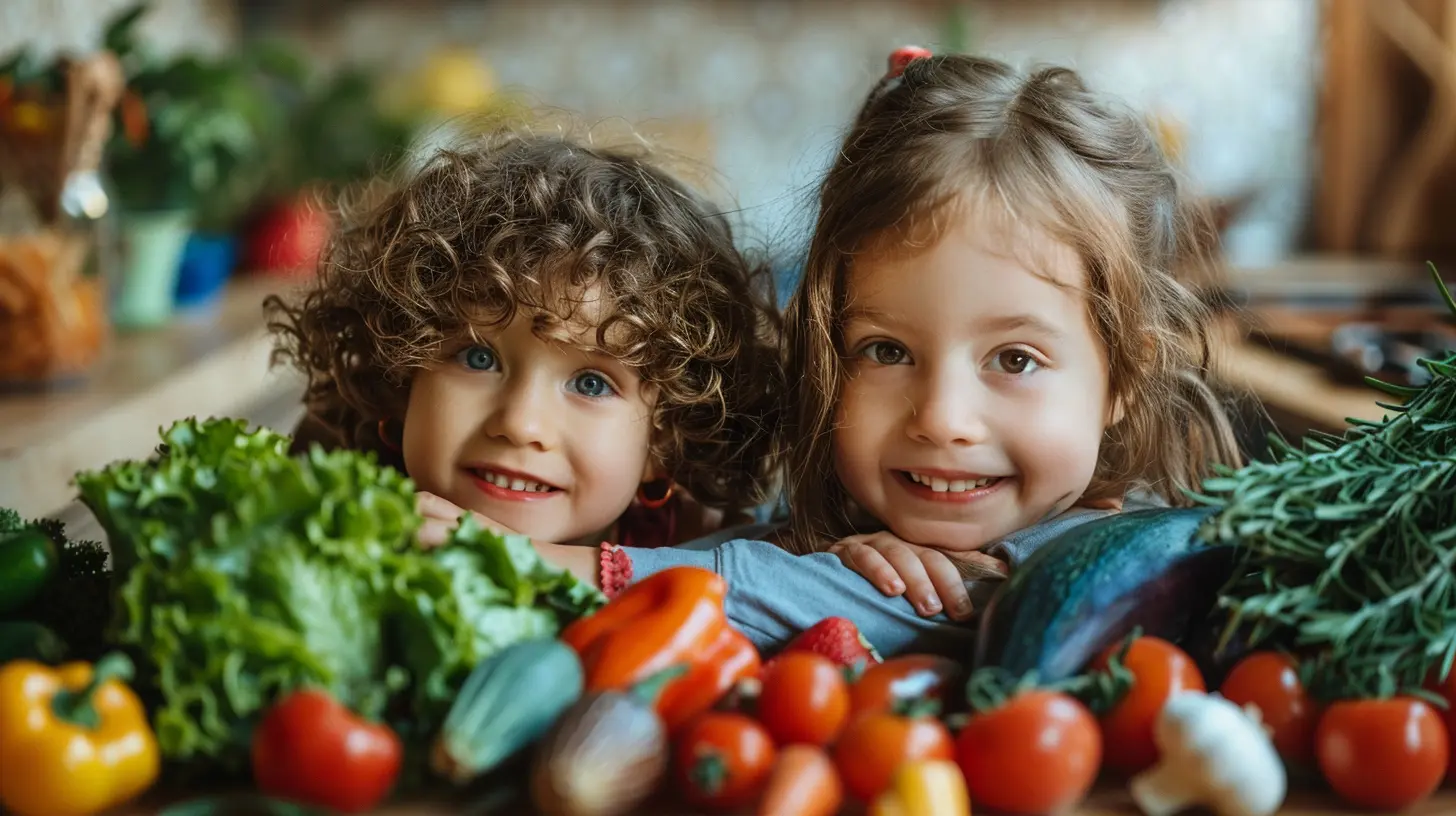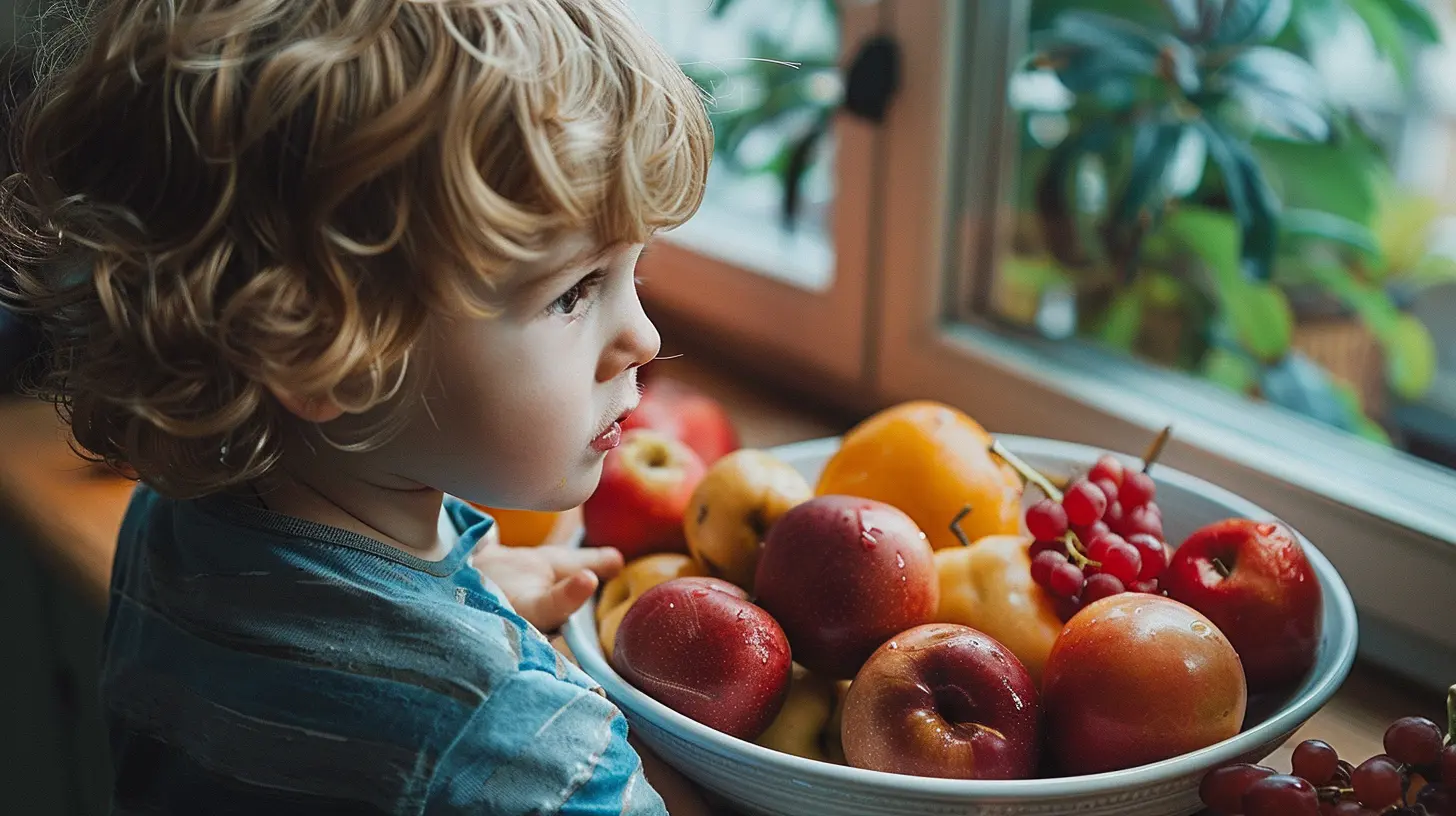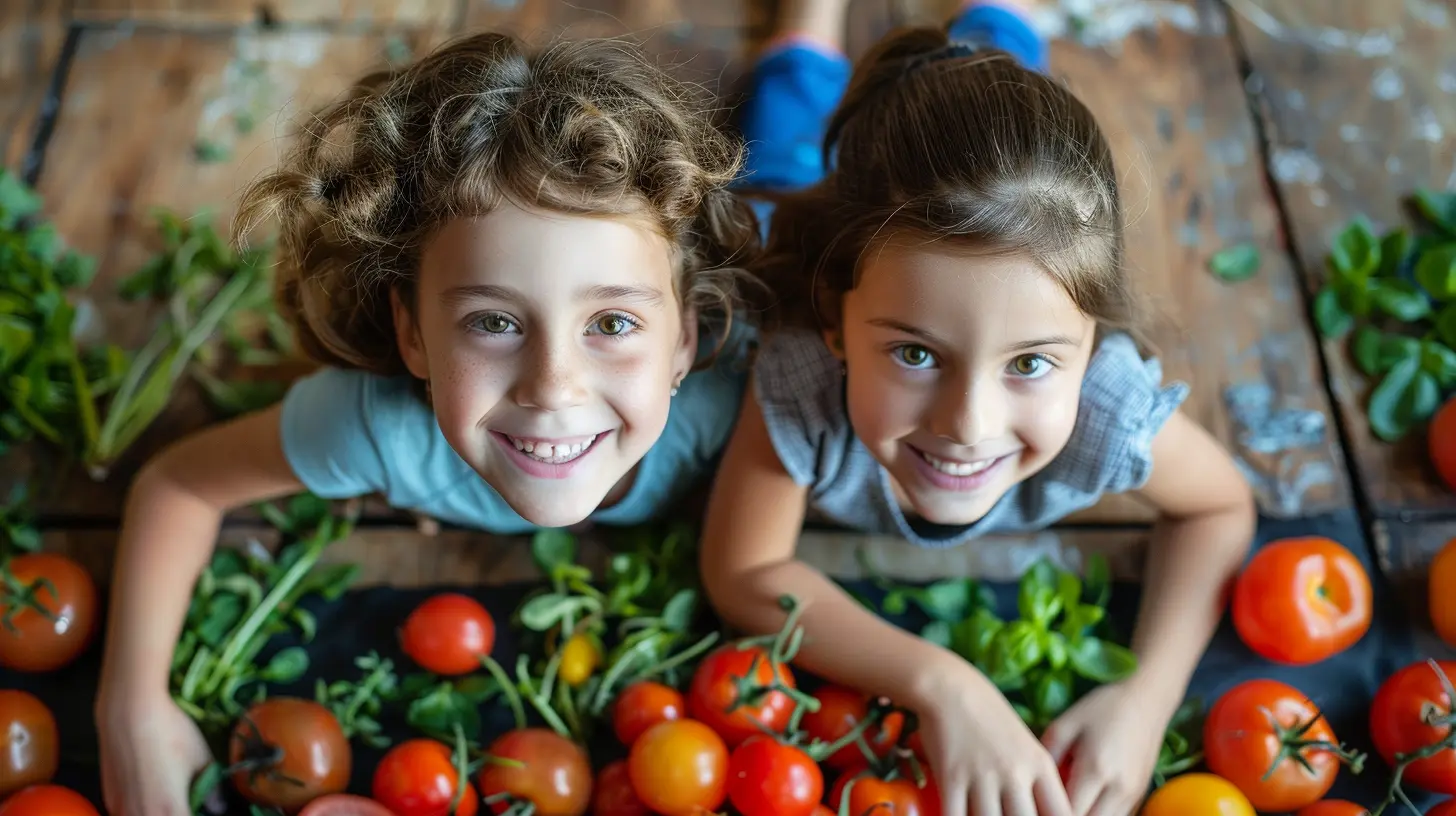The Connection Between Nutrition and Emotional Stability in Kids
4 December 2024
As parents, we're constantly juggling a thousand things—school, homework, extracurriculars, playdates, you name it. But there’s one piece of the puzzle that often doesn’t get enough attention, even though it can massively impact how our kids feel and behave: nutrition. Have you ever noticed how your child's mood can swing wildly depending on what they’ve eaten (or not eaten)? That connection between what goes into their body and how they react emotionally is more significant than most people realize.
In this article, we’ll dive deep into the link between nutrition and emotional stability in kids, how the foods they eat today can affect their mood tomorrow, and what you can do as a parent to help them maintain balance.

Why Do Food and Feelings Go Hand-in-Hand?
Have you ever had a bad day and reached for a tub of ice cream? Or maybe you’ve noticed how tired and cranky your kid gets when they're overdue for a snack. This isn't just a coincidence—what we eat directly affects how we feel, and for kids, who are still developing physically and emotionally, this connection is even more pronounced.At the root of it all, we are biological machines fueled by what we consume. Nutrients from food don’t just give us energy to move our bodies; they also influence the production of neurotransmitters—chemicals in the brain that regulate mood, focus, and emotional responses. So, in short, good nutrition can help stabilize emotions, while poor nutrition can cause emotional instability. It’s kind of like putting diesel in a gasoline engine—without the right fuel, things get messy!
The Gut-Brain Connection: More Than Just a Feeling
Recently, researchers have been focusing more on what they call the "gut-brain connection." You may have heard the phrase “gut feeling,” and it turns out, that phrase is more literal than we thought. The gut is home to trillions of bacteria, collectively known as the gut microbiome, which play a key role in producing those feel-good chemicals like serotonin and dopamine.In fact, about 95% of serotonin (a neurotransmitter linked to happiness and emotional well-being) is produced in the gut, not the brain! If your child’s diet isn’t feeding the good bacteria in their gut with fiber-rich and diverse foods, their mood can take a hit.

The Nutrients That Help Maintain Emotional Stability
So what exactly should you be feeding your kids to support their emotional balance? Let’s break down some of the most important nutrients that help kids maintain emotional stability and mood control.1. Omega-3 Fatty Acids:
These healthy fats are found in foods like salmon, walnuts, and flaxseeds. Omega-3s are essential for brain development and function. Studies show that kids who consume adequate Omega-3s tend to have better emotional regulation and lower chances of developing mood disorders.You can think of Omega-3s as the oil that keeps your brain running smoothly, helping kids keep their cool, even in frustrating situations.
2. B Vitamins:
B Vitamins, including B6, B9 (Folate), and B12, are crucial for energy production and neurotransmitter regulation. When kids don’t get enough B vitamins, they’re more likely to feel fatigued, irritable, or even anxious.Foods like leafy greens, eggs, and whole grains are packed with B vitamins that can give your child's emotions a boost!
3. Magnesium:
Magnesium is known as the "chill-out" mineral because it helps to relax our bodies and minds. It plays an important role in regulating neurotransmitters and calming the nervous system.Kids need magnesium to stay calm and not get overly worked up during stressful situations. Foods like almonds, avocados, and dark chocolate are fantastic sources.
4. Protein:
Proteins are made up of amino acids, the building blocks for neurotransmitters like serotonin and dopamine, which affect mood regulation. Without enough protein, a child’s body might have trouble synthesizing these essential mood-regulating chemicals.Adding sources like lean meats, beans, dairy, and eggs to your child’s diet ensures they get the amino acids they need to stay emotionally balanced.
5. Iron:
Iron is necessary for oxygen transportation in the body and is critical for energy. A child with low iron levels can experience fatigue, low energy, and irritability. Foods rich in iron, like red meat, lentils, and spinach, are essential to keeping your child’s mood stable.6. Complex Carbohydrates:
Unlike sugary snacks and simple carbs that give a quick spike (and crash) in energy, complex carbohydrates offer steady fuel that keeps blood sugar levels stable. When blood sugar dips too low, kids can feel cranky, anxious, and even aggressive.Incorporating whole grains, sweet potatoes, and oats can help maintain stable energy levels, which may lead to more consistent mood regulation.

Foods to Avoid: The Emotional Rollercoasters
Unfortunately, not all food is friendly to emotional stability. There are certain foods that can lead to a quick emotional high but are usually followed by an emotional crash.1. Sugar:
We’ve all seen the infamous sugar rush followed by the inevitable crash. Sugar causes a rapid increase in blood sugar levels, prompting the body to release insulin to bring them back down. This sudden drop can trigger irritability and mood swings.Those sugary cereals or mid-day candy bars may be tempting, but they’ll likely make your child sluggish, cranky, or even anxious after the initial high fades.
2. Processed Foods:
Many processed foods are high in sugar, unhealthy fats, and artificial additives, which can totally throw off your child’s mood. Studies show that kids who regularly consume fast food or ultra-processed snacks have higher rates of depression and anxiety.3. Caffeine:
This one’s more of an issue with older kids and teens, but it’s important nonetheless. Caffeine, found in sodas and energy drinks, can cause jitteriness, anxiety, and mood swings. It’s best to keep caffeine intake to a minimum to maintain emotional equilibrium.
How Meal Planning Can Help Stabilize Mood
One of the best ways to ensure your child is eating for emotional stability is to plan meals that include a wide variety of nutrient-dense foods. Balance is key here. You want to incorporate proteins, healthy fats, fiber, and complex carbohydrates into their meals consistently.1. Start The Day Right with Breakfast:
Skipping breakfast, or consuming a meal high in refined sugars, can set the tone for the rest of the day. A balanced breakfast with protein, whole grains, and healthy fats—like scrambled eggs with whole wheat toast and avocado—can help them start their day on the right foot.2. Healthy Snacks:
To avoid mood swings between meals, offer nutrient-rich snacks like nuts, fruits, vegetables with hummus, or yogurt. This will keep their blood sugar stable and their minds steady.3. Hydration:
It’s not just about food; hydration plays a big role in mood as well. Dehydration can lead to irritability and trouble concentrating. Make sure your child drinks plenty of water throughout the day.4. Consistent Meal Times:
Try to have regular meal and snack times. Kids thrive on routine, and predictability helps maintain their blood sugar levels, which in turn stabilizes their mood. When they know what to expect, it can reduce anxiety and prevent emotional outbursts.The Role of Lifestyle Choices
While nutrition plays a starring role in emotional stability, it’s not the whole movie. Other lifestyle choices also play a part:1. Sleep:
We all know how grumpy we get when we're sleep-deprived, and kids are no different. A well-rested child is much more likely to have a balanced mood. Establishing a bedtime routine and sticking to it ensures they get the rest they need.2. Exercise:
Emotional well-being isn’t just about what we put in our bodies but how we move them too. Regular physical activity helps kids burn off extra energy, clear their minds, and release endorphins—those 'feel-good' chemicals that can instantly elevate mood.
When to Seek Help
While nutrition and lifestyle changes can significantly impact emotional stability, it's also important to recognize when it might be time to consult a professional. If you’ve noticed that your child’s mood swings are happening frequently, are severe, or seem out of their control, it might be necessary to talk to a pediatrician or child psychologist. Often, they can provide strategies, or even help you pinpoint specific nutritional deficiencies that might be exacerbating the problem.Conclusion
Parenting is hard enough without having to deal with constant emotional swings from our kids, right? But the good news is that the right nutrition can be a powerful tool in helping your child navigate their emotions with greater ease. You don’t need to overhaul your entire meal plan overnight—but small, mindful changes can make a big difference over time.By incorporating nutrient-dense foods that support brain health and mood stability, while minimizing processed, sugary snacks, you’re setting your child up for emotional success. You might even notice improvements in concentration, energy levels, and sleep. Isn't it amazing how what we eat can affect how we feel?
all images in this post were generated using AI tools
Category:
Emotional DevelopmentAuthor:

Maya Underwood
Discussion
rate this article
14 comments
Arwenia Henson
Empower your child’s mind and heart—nourish them with love and balanced nutrition!
February 12, 2025 at 3:23 PM

Maya Underwood
Thank you! Love and balanced nutrition are indeed essential for fostering both emotional stability and cognitive development in children.
Elle Gutierrez
Great article! It's so important to recognize how nutrition impacts our children's emotional well-being. By making mindful food choices, we can help nurture their resilience and stability. Your insights provide valuable guidance for parents looking to support their kids' mental health through a balanced diet. Thank you!
February 1, 2025 at 5:46 PM

Maya Underwood
Thank you for your thoughtful comment! I'm glad you found the article helpful in highlighting the vital link between nutrition and emotional well-being in children.
Damon Blair
This article beautifully highlights the vital link between what our kids eat and their emotional well-being! It's a reminder for all parents to prioritize healthy nutrition, as it not only fuels their bodies but also nurtures their minds. Great insights here—thank you for sharing!
January 29, 2025 at 5:07 PM

Maya Underwood
Thank you for your kind words! I'm glad you found the insights valuable. Prioritizing nutrition is indeed crucial for our children's well-being.
Taylor Gill
Nutrition truly shapes our children's emotional health and resilience.
January 27, 2025 at 3:57 AM

Maya Underwood
Absolutely! Nutrition plays a crucial role in children's emotional well-being, influencing both mood and resilience. Thank you for highlighting this important connection!
Onyx Barnes
Great article! It's inspiring to see how nutrition plays a vital role in our children's emotional well-being. By prioritizing healthy eating, we can nurture not only their bodies but also their minds. Let's empower our kids with the nutrients they need to thrive emotionally and create a brighter, happier future together!
January 24, 2025 at 4:52 PM

Maya Underwood
Thank you for your thoughtful comment! I’m glad you found the article inspiring—healthy nutrition truly is key to fostering our children's emotional well-being. Together, we can make a positive impact!
Wren McGonagle
I’m fascinated by the link between nutrition and emotional health in kids! How can specific foods impact mood and behavior? I'd love to hear more on practical tips for parents!
January 20, 2025 at 5:45 AM

Maya Underwood
Absolutely! Foods rich in omega-3 fatty acids, like fish, can boost mood, while fruits and vegetables support overall brain health. Parents can encourage balanced meals, limit sugar and processed foods, and incorporate snacks like nuts and yogurt to help stabilize emotions.
Lucy McSweeney
Loved this insight on how nutrition impacts our kids' emotional well-being! It’s fascinating to see how what they eat can influence their mood and behavior. As a parent, I’m eager to explore more ways to nourish both their bodies and minds. Thank you for sharing!
January 18, 2025 at 5:12 AM

Maya Underwood
Thank you for your encouraging words! I'm glad the article resonated with you. Nourishing both body and mind is crucial for our kids' overall well-being. Happy exploring!
Ford Young
Balanced nutrition is vital; it supports emotional stability and overall well-being in children.
January 15, 2025 at 3:26 AM

Maya Underwood
Thank you for highlighting the importance of balanced nutrition! It's crucial for fostering both emotional stability and overall well-being in children.
Izaak McAdams
Nutrition significantly influences children's emotional well-being; balanced diets promote stability, reduce anxiety, and enhance overall mental health.
December 30, 2024 at 3:47 AM

Maya Underwood
Thank you for your insight! I completely agree—nutrition plays a crucial role in shaping children's emotional health and stability.
Murphy Erickson
Nutrition is key for kids’ emotional well-being!
December 19, 2024 at 4:03 PM

Maya Underwood
Absolutely! Proper nutrition plays a crucial role in children's emotional health, impacting mood, behavior, and overall well-being.
Izaak Thompson
This article effectively highlights the crucial link between nutrition and emotional stability in children. It’s vital to recognize that a balanced diet not only supports physical health but also influences mood and behavior. Parents should prioritize nutritious meals to foster their children's emotional well-being.
December 12, 2024 at 4:13 PM

Maya Underwood
Thank you for your insightful comment! I'm glad you found the article impactful in highlighting the importance of nutrition for children's emotional well-being.
Colt McNab
Healthy food, happy kids—simple as that!
December 6, 2024 at 4:50 PM

Maya Underwood
Absolutely! Nutrition plays a crucial role in our children's emotional well-being. Healthy food fuels both their bodies and minds, fostering happiness and stability.
Tamara McDaniel
Nutrition plays a crucial role in kids' emotional health; a balanced diet can foster better mood and behavior.
December 4, 2024 at 4:04 PM

Maya Underwood
Absolutely! A balanced diet is essential not just for physical health but also for supporting emotional well-being in children. Thank you for highlighting this connection!
Roxanne Valentine
Thank you for shedding light on this vital connection! It's a reminder for all parents to prioritize nutrition, as it profoundly impacts our children's emotional well-being.
December 4, 2024 at 4:59 AM

Maya Underwood
Thank you for your thoughtful comment! I'm glad you found the connection between nutrition and emotional well-being insightful. Prioritizing healthy eating can indeed make a significant difference in our children's lives.
MORE POSTS

How to Handle Chores in a Blended Family

Social Media and Its Impact on Emotional Development in Kids

Managing Public Tantrums Without the Stress

Cultural Celebrations: Incorporating Your Ancestry Into Family Traditions

How Sleep Impacts Your Child’s Mental Health

Chores for Preschoolers: Keeping It Simple and Fun

How Sleep Training Impacts a Toddler’s Growing Independence

Dealing with Preschool Fears: Monsters and Shadows

Managing Sibling Rivalry in a Preschool Setting